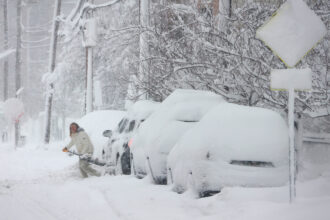GUANGZHOU, China—On the the eve of the opening of the Asian Games, the world’s second largest sports event, host city Guangzhou is looking greener—at least cosmetically.
In a last-ditch push to reduce air pollution in this smog-choked industrial powerhouse, capital of China’s Guandong Province, a few weeks ago government officials issued a raft of measures, big and small, intended to minimize pollutants.
No barbequeing, the city commanded its inhabitants. Stop construction. Stop driving. Take the subway—it’s now free.
Last week, Guangzhou Environmental Protection Bureau head Ding Hongdu said the agency was using an “iron fist” to clean the air.
But skeptics doubt the impact of these short-term tactics, and there are no reliable measurements to indicate whether they are having any effect on Guanzhou’s air quality. Moreover, noncompliance abounds.
“Yes, the air is feeling cleaner—only because of the autumnal breeze,” said Kuang Mei, who runs a snack shop in downtown Guangzhou. “All the government has done is mostly for show.” Kuang recalled the peak of this past summer, when the stifling combination of low air pressure and a high concentration of particulates made it difficult to breathe.
As if on cue, a diesel-burning motorbike pulled up in front of Kuang’s shop to deliver goods nearby.
The city government’s aggressive campaign to reduce air pollution—including a ban on motorcycles since 2007—has been six years in the making. In that time period, Ding said in a press conference last week, more than 6,000 factories were ordered to undergo upgrades, and 147 factories that had repeatedly failed pollution tests were shut down or relocated to the fringes of Guangdong Province, according to state media reports.
None of these figures have been independently verified. The international environmental NGO most active in the region, Greenpeace East Asia, does not monitor air quality in Guangzhou.
Measures May Linger After Asian Games End
But there may be longer term implications, according to Richard Balme, who studies environmental policy-making at Sciences Po in China. He noted that some of the pollution-mitigating measures introduced before the 2008 Beijing Olympics are still in place, notably weekly driving restrictions on private cars. He expects the Guangzhou policies may have an impact beyond the Asian Games, which end on Nov. 27.
Limiting private car driving is one step Guangzhou has taken as well. Since Nov. 1 the alternate-day driving rule for private cars has been enforced vigorously. Free rides on the subway and all buses led to chaos in the already-crowded metro system as retirees and seniors jostled with regular commuters. The government resumed charging public transit riders this week.
But enforcement in other areas is weak, and exceptions are widely exploited. Despite the 2007 ban on motorcycles, those with a handicap or special needs are eligible for a motorcycle license. Many bikes have been retrofitted to transport goods and passengers for a fare comparable to that charged by cabbies.
If the police get serious with a crackdown, motorcycle driver Xu Dechang is ready to put up a fight: “If I’m not allowed to operate my bike during the Asian Games, how am I going to get around?”
For now, one thing is sure: Guangzhou has put out its best “green” face. Everywhere one turns there are newly planted trees and shrubs. Landscaped greenways have been installed to buffer residential neighborhoods from busy thoroughfares. Even most highways are lined with layers of green plants.
The pollution-fighting efforts have also bolstered the province’s national standing. In the latest “green development index” developed by Beijing academics, which ranks cities and provinces according to their performance in maintaining a balance between economic expansion and environmental protection, Guangdong Province came in among the top ten—better than two-thirds of the country.
Image: bfishadow via flickr Creative Commons
ICET Piloting Voluntary Climate Registry in Southern China
A Warning to Clean Energy Companies Eyeing China’s Markets
About This Story
Perhaps you noticed: This story, like all the news we publish, is free to read. That’s because Inside Climate News is a 501c3 nonprofit organization. We do not charge a subscription fee, lock our news behind a paywall, or clutter our website with ads. We make our news on climate and the environment freely available to you and anyone who wants it.
That’s not all. We also share our news for free with scores of other media organizations around the country. Many of them can’t afford to do environmental journalism of their own. We’ve built bureaus from coast to coast to report local stories, collaborate with local newsrooms and co-publish articles so that this vital work is shared as widely as possible.
Two of us launched ICN in 2007. Six years later we earned a Pulitzer Prize for National Reporting, and now we run the oldest and largest dedicated climate newsroom in the nation. We tell the story in all its complexity. We hold polluters accountable. We expose environmental injustice. We debunk misinformation. We scrutinize solutions and inspire action.
Donations from readers like you fund every aspect of what we do. If you don’t already, will you support our ongoing work, our reporting on the biggest crisis facing our planet, and help us reach even more readers in more places?
Please take a moment to make a tax-deductible donation. Every one of them makes a difference.
Thank you,











